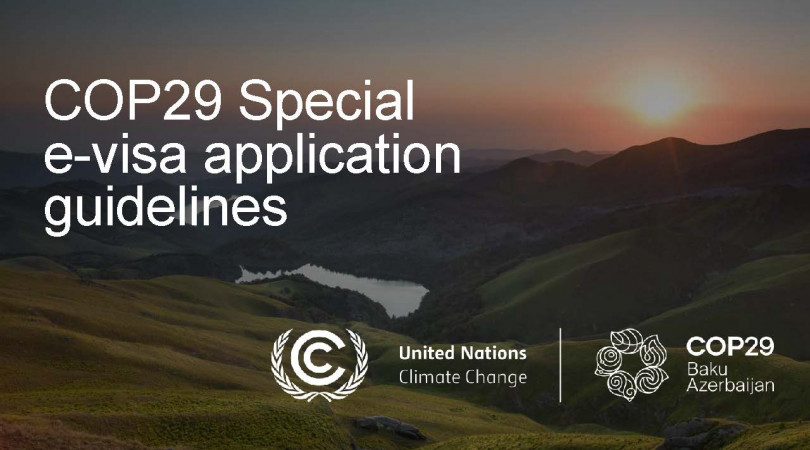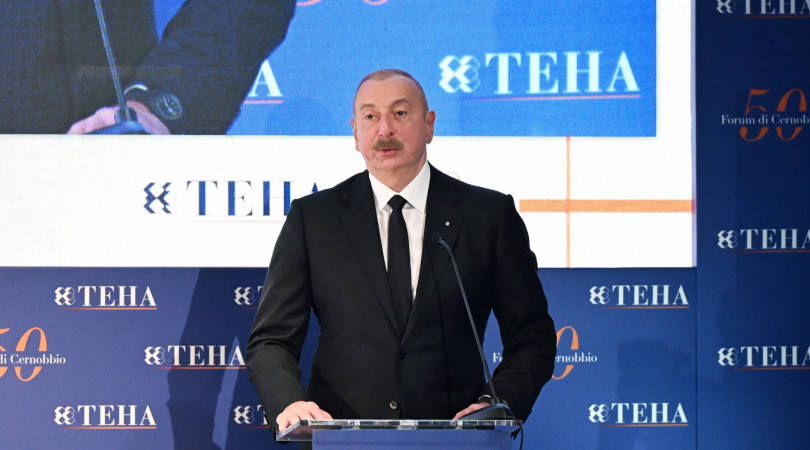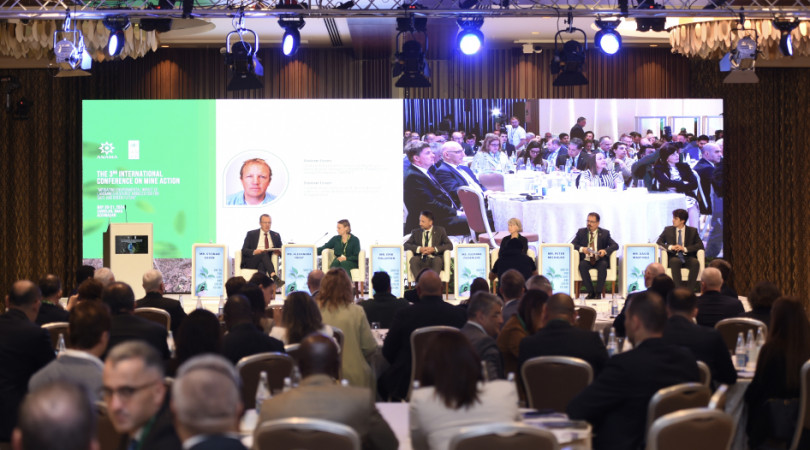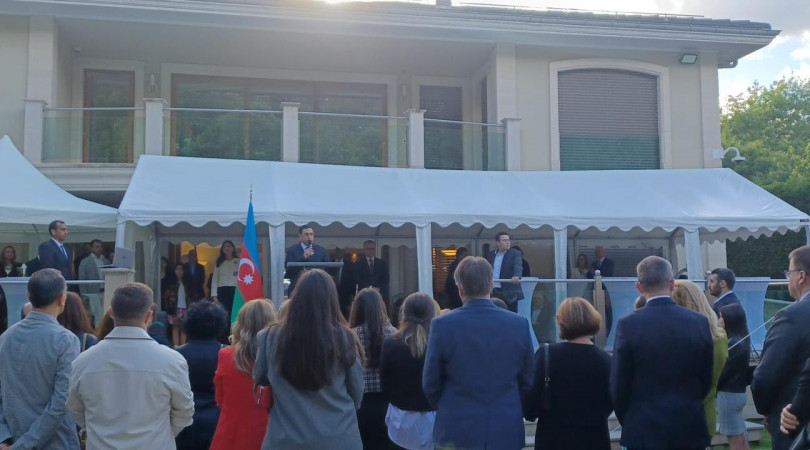COVID-19 response measures in the Republic of Azerbaijan
- General information
Azerbaijan adopted the robust strategy to fight the COVID-19 and to minimize the impact of the pandemic on the population. The national authorities have implemented several containment measures to halt the spread of COVID-19 with people-centered approach.
On 30 January 2020, the Cabinet of Ministers of the Republic of Azerbaijan issued the Action Plan to prevent the spread of novel coronavirus in the country. The Government established the Task Force under the Cabinet of Ministers on 27 February 2020, consisting of senior officials of the relevant authorities to coordinate the measures taken by the Government in response to the spread of the coronavirus in the country.
On 19 March 2020, the President of the Republic of Azerbaijan signed the Executive Order on measures to protect public health in Azerbaijan and strengthen the counter measures against the coronavirus infection. According to the Decree, Special Coronavirus Response Fund was established to provide financial assistance to the country’s response measures. Around 12 million US dollars were allocated to the Fund from the President`s Contingency Fund.
Presidential Executive Order, dated 19 March 2020 regulates a number of measures to reduce the negative impact of coronavirus pandemic on the economy of Azerbaijan, macroeconomic stability, employment, and entrepreneurship. The Action Plan aimed at implementing the Presidential Order includes large-scale, effective, and efficient measures. 2 billion US dollars have been allocated for these purposes.
Today, over 20 state-owned hospitals serve COVID-19 patients in Azerbaijan. One of the largest and most modern hospitals in the country - the New Clinic - was inaugurated shortly after the outbreak of the COVID-19.
According to the Executive Order signed by the President of the Republic of Azerbaijan on 7 April 2020, four modular hospitals for COVID patients have been constructed within a short period of time in and around capital city Baku as a part of additional measures. It is planned to build six additional modular hospitals in the regions of Azerbaijan. These modular hospitals will provide additional 2000 hospital beds.
The local production of face masks has been launched in Azerbaijan as the next step to fight the global coronavirus pandemic. Along with medical masks, disposable protective clothing, disinfectants, sanitizers, etc. are also produced locally.
In its global efforts to fight COVID-19 pandemic and expressing its solidarity with states affected by the virus, the Government of Azerbaijan has donated 5 million US dollars to the World Health Organization (WHO). Additional 5 million US dollars were donated by Azerbaijan in its capacity of current Chair of the Non-Aligned Movement to WHO to support the most affected NAM countries. In his letter of 23 March 2020, the WHO Director-General expressed appreciation to the President of the Republic of Azerbaijan for his country’s contribution to the global response to COVID-19 and for the measures taken in Azerbaijan to combat the pandemic. Azerbaijan has also provided urgent humanitarian aid to 29 affected countries on a bilateral basis, including technical and medical supplies, financial assistance, providing transport airplanes, etc.
The virtual Summit of the Cooperation Council of the Turkic-Speaking States of 10 April 2020 and the virtual Summit of the NAM Member States of 4 May 2020 dedicated to the fight against COVID-19 were held at the initiative of Azerbaijan, which currently serves as a Chair of the Council and of the Movement. The UN Secretary General, the President of the UN General Assembly, the WHO Director-General, the Chairman of the African Union, and for the first time the Vice-President of the European Commission addressed the NAM Summit.
- Measures across different areas
- Social protection
- Prevention of unjustified dismissals or reductions in the number of jobs;
- Continuation of paying salaries to employees working from home;
- Creation of additional 50,000 paid public jobs in 2020;
- Provision of a lump-sum payment for 600,000 unemployed persons;
- Simplification of the application procedure for a lump-sum payment on the web portal of the Ministry of Labour and Social Protection;
- Involvement to a self-employment programme;
- Expansion of the unemployment insurance coverage to 20,000 persons;
- Scholarships for those who have had breaks in vocational training courses;
- Use of reserves of 2019 of the State Social Protection Fund for the period from April until December 2020 to ensure the sustainability of social payments (pensions and benefits) to the population;
- Extension of the payment of targeted state social assistance to low-income families until the 1st day of the month following the end of the quarantine regime;
- Expansion of the coverage of targeted state social assistance program;
- Payment of annual tuition fees from the state budget (24 million US dollars) for students from socially vulnerable families;
- Allocation of funds from the state budget to meet the needs of citizens for medical masks (2,7 million US dollars);
- Temporary increase of existing discount limits on electricity use (5,9 million US dollars).
- Economy
- Adoption and successful implementation of a comprehensive Action Plan to ensure sustainable development, including reducing the negative impact of the pandemic on the country’s economy and employment;
- Increase in the economic growth rate (0,2%) due to the economic reforms implemented in the past years and the created potential, despite the impact of COVID-19 on national economy;
- The support program (estimated at 1,47 billion US dollars – 3,1 % of GDP), which is not only an anti-crisis measure, but also a program of economic expansion, credit expansion, and stimulation of aggregate demand. This wide-range support package adopted by the Government serves sustainable development goals, including the preservation of social balance and economic development in the post-pandemic period;
- Direct financial support to 300,000 individual entrepreneurs in the affected sectors of economy (47 million US dollars);
- Partial payment of salaries to 300,000 employees in these sectors (127 million US dollars);
- Temporary exemptions from taxes, insurance, and customs payments in affected sectors of economy (68 million US dollars);
- Providing financial support to vital passenger transportation systems (165 million US dollars);
- Issuance of state guarantees and subsidizing interest rates on bank loans to businesses operating in pandemic-affected areas (0,3 billion US dollars);
- Subsidizing part of the interest rate on existing bank loans without state guarantees (0,6 billion US dollars);
- Non-periodic calculation of rents on state property and State Land Fund;
- Exemptions from temporary customs duties for food and medical products necessary for the needs of population;
- Continuation of state support measures and promotion of private investments in the areas identified as the main priorities of the state's economic policy in mid-term period;
- Salary increase by 3 times for first-line medical staff during the period of the pandemic.
- Education
- Temporary closure of all educational institutions in Azerbaijan since 2 March 2020 to reduce the spread of the COVID-19;
- Broadcasting TV classes on national TV channels,which enables all students to have a continued access to education. All recorded TV programs are also available online on a learning platform of the Ministry of Education;
- Weekly broadcasting live interactive sessionsin addition to TV classes;
- Launch of the National Platform for Tasks for school students aimed at providing feedback and monitoring students’ engagement across the country;
- Supporting local teachers, as well as local educational authorities in launching online classes for different student groups and providing trainings for teachers;
- Provision of technical support and guidance for all local educational authorities in terms of capacity building for teachers, adjusting content, increasing student motivation. More than 1000 teachers are covered by online trainings on distant education;
- Launch of the campaign “Stay at home, create at home” which is a virtual competition (STEAM classes) among school students aiming to keep students motivated, while promoting creativity among them;
- Broadcasting TV classes on national TV channels for children enrolled in various types of pre-school institutions;
- Providing various online extracurricular activities for schoolchildren, such as online chess tournament, online arts competitions (painting, singing, playing musical instruments), as well as “Scientist of the Day” in cooperation with NASA;
- Preparation of video content for vocational educationby the State Agency on Vocational Education (SAVE) and with the support of UNDP and GIZ (Germany);
- Providing distant educationfor higher education Most of the universities are using Microsoft TEAMS platform provided by the Ministry of Education free of charge for online teaching process, as well as through other virtual platforms. Students who are not able to follow online lectures, have the opportunity to watch the uploaded video recordings of those lectures, as well as to access to the reading materials via online tool of their respective university.
- Women and children
- Women-centered programs to address socio-economic impact of COVID-19;
- Strengthening the work of 11 Child and Family Support Centres by the State Committee for Family, Women and Children Affairs (SCFWCA);
- Prevention by the staff of the Child and Family Support Centres of cases of domestic violence during special quarantine period and provision of psychological assistance to the victims. In total, 7000 families from the regions received necessary assistance;
- Provision of online psychological assistance to women, children and older persons by Child and Family Support Centres and launch of “Online Psychological Assistance” project which has already benefited 2300 people;
- Visits to vulnerable families for the assessment of their needs, as well as provision of food, psychological assistance, and medical masks;
- Launch of “From Family to Family” campaign to decrease the impact of the pandemic on social isolation. As part of this campaign, 75 families provided assistance to 594 vulnerable families;
- Focus of Women Resource Centres on vulnerable and socially excluded group of women, providing them with necessary support, and launch of local campaigns to help low-income families to cope with the pandemic. During this period, over 100 women from remote parts of the country participated in online business development trainings;
- Involving women’s networks, civil society, and women entrepreneurs. SCFWCA, Women Resource Centres, and UNDP helped 340 rural families by providing food packages. Most content of these packages, including eco-packaging itself, was purchased from women entrepreneurs, which also helped them sustain their small businesses;
- Conducting surveys (441 surveys) by 11 Child and Family Support Centres to study the situation of families during special COVID-19 quarantine regime in the country;
- Provision of NGOs run crisis centres and shelters with personal protection equipment and necessary medical supplies jointly with international organizations to protect survivors, as well as employees;
- Access for women and girls to COVID-19 related public health information provided by SCFWCA, Child and Family Support Centres, and Women Resource Centres;
- Awareness raising campaign to combat gender-based violence in the context of COVID-19 crisis;
- Awareness raising campaign among families in remote and rural areas through the “Call to Families” (3300 families) and distribution of special informative booklets (around 600 families);
- Awareness raising sessions for women with disabilities, such as project “Addressing the rights and well-being of women with disabilities” funded by the Ministry of Labour and Social Protection and implemented jointly by UNDP, UNFPA, and SCFWCA;
- Holding online trainings, webinars, campaigns, such as:
- psychological problems in families during the pandemic and ways to
- address them;
- how to talk about the pandemic with children;
- how to manage mental health and education in self-isolation period;
- legal aid to victims of domestic violence;
- role of social workers in preventing gender-based violence during the
pandemic;
- psychological pressure and problems in the families during the period of
COVID-19 and social distancing;
- psychological rehabilitation of children with special needs in the period
of quarantine;
- importance of successful communication and joint activities with children
in a family;
- guidance on how to be protected against the virus;
- access to services for the victims of domestic violence during COVID-19;
- gender and reproductive health;
- “Stay at home with your kids” campaign;
- internet safety of children and ways to ensure it;
- TV programs on family relationships, domestic violence, children’s rights,
women’s rights, etc.
- Special attention to the issues of reproductive health during the COVID-19 and self-isolation. Communication materials for health workers on COVID-19 response have been developed and distributed among prenatal centres and antenatal clinics in partnership with UNFPA and Azerbaijani health-care institutions;
- Materials on reproductive and sexual health in the period of COVID-19;
- Maternal and new born health-care in times of COVID-19;
- Handbook for pregnant women and lactating mothers on COVID-19;
- Assistance to single and older women, as well as bedridden persons with limited access to leave home by Child and Family Support Centres in cooperation with the State Customs Committee and volunteers of ASAN State Agency of Public Service.
- Internally displaced persons
- Ban on all mass gatherings in the IDP settlements from the early stages of the virus spreading;
- Awareness-raising activities among the displaced population on how to protect communities against COVID-19;
- Full access by IDPs to health services;
- Conducting online consultations, using modern ICTs in interaction with the displaced people to address their needs;
- Launch by the State Committee on Refugees and IDPs Affairs of the project “Virtual reception” which enables displaced persons to interact with the State Committee’s officials in online interactive format. Each session through this online platform has the capacity to simultaneously involve around 200 displaced persons;
- Identifying the most vulnerable segments of the IDP community which seeks social assistance;
- Provision of food assistance to IDPs. Since the start of the lockdown measures in Azerbaijan, 3387 IDPs have received food assistance;
- Provision of food assistance to older persons, lonely people and low-income families in the IDP community. Until now, 444 IDP families have received food assistance.
- Older persons and persons with disabilities
- Extension of the term of disability of persons, including children with disabilities (around 14,000 persons) that expired on 1 March 2020, until the 1st day of the month following the end of the quarantine regime;
- Provision of rehabilitation and social services to persons with disabilities at their homes;
- Provision of social services for lonely people older than 65 at their homes;
- Provision of services in social care facilities for persons who need special care;
- Providing 500 persons with disabilities with training and equipment in cooperation with UNDP to start their small businesses.
- Migrants
- Extension of temporary staying period of foreigners and stateless persons who have been registered upon place of residence in Azerbaijan;
- Electronic provision of services such as extension of temporary staying, permission for temporary and permanent residence, work permission, etc.;
- Consultations through 24 hours call centre, “Online guide”, and mobile application MIGAZ;
- Compliance of immigration detention centres to recommendations and requirements of WHO and the COVID-19 Operational Headquarters of the Cabinet of Ministers of the Republic of Azerbaijan;
- Putting in place all necessary measures to protect health of immigrants in immigration detention centres;
- Temporary suspension of forced return of immigrants;
- Cooperation between the State Migration Service and offices of relevant international organizations in Azerbaijan to prevent violation of the migration legislation of Azerbaijan by foreigners held in quarantine, and consequently to prevent imposing administrative punishments upon them;
- Electronic acceptance of applications for refugee status;
- Provision of food assistance to persons with refugee status and to persons who have applied for refugee status in Azerbaijan.
- Justice system
- Pardoning by the Presidential Decree of 6 April 2020 of 176 prisoners aged over 65 in need of special care due to their age and state of health, in the context of the COVID-19 pandemic;
- Granting early releases to 624 prisoners;
- Granting home confinement or other alternatives to 310 inmates;
- Implementation of court proceedings related to civil cases and commercial disputes through “Electronic court” information system;
- Continuing all necessary preventive measures to curb the spread of coronavirus;
- Regular examinations of the penitentiary facilities by monitoring groups of the Ministry of Justice and civil society representatives.
- Internet
- Use of ICTs in national response to cope with impact of COVID-19 from the early stages of the pandemic;
- Launch of the interactive informational portal (koronavirusinfo.az) of the Operational Headquarters to ensure access to COVID-19 related information for all, as well as awareness-raising on measures taken to combat the virus, operational news about the rules, instructions and recommendations of the Azerbaijani Government on protecting public health;
- Providing relevant important information through SMS system;
- Launch of one-stop digital platform “Stay Home” (evdeqal.az) by the Ministry of Transport, Communications and High Technologies in cooperation with UNDP, which makes e-services available to everyone during the pandemic. The platform allows the visitors to find links to online stores, e-education, e-health, e-entertainment, e-food, e-delivery, provides advise on social distancing and staying at home, and offers numerous e-learning resources including the information on ways of setting up and running digital businesses from home;
- Launch of a special e-platform enabling people to get permissions to leave their homes during the quarantine regime and employers to get permissions for their staff to go to their offices;
- Launch of a new video-conferencing system (VCaaS) for the first time in Azerbaijan based on AzCloud;
- Creation of a self-checker bot “Shefa” by the Public Health and Reforms Centre of the Ministry of Health in partnership with UNDP, available at isim.az. This coronavirus self-checker is intended to help health authorities answer more queries, enabling medical professionals to look after patients who need critical care;
- Creation of WhatsApp bot by health authorities in partnership with UNDP to answer questions of public about coronavirus and to give prompt, reliable and official information 24 hours a day;
- Launch of a mobile application by the Ministry of Health in partnership with UNDP to help healthcare professionals to make more informed decisions based on latest research findings and data.
- Volunteering
It is also important to highlight the important role of volunteerism during the crisis. Volunteers are among the first responders to the COVID-19 outbreak and they create social bonds and give a voice to marginalized and vulnerable groups. The President of Azerbaijan has declared 2020 the “Year of Volunteers”. The Coordination Centre for Azerbaijani Volunteers was established at the initiative of volunteer movements and organizations in order to contribute to prevention of the spread of coronavirus and its possible consequences, especially to educate the population and provide social services to people in need. Essential hygiene and sanitation items (e.g. medical masks, sanitary pads, hand sanitizers, etc.), medicine, and food supplies were distributed by volunteers in order to ensure continuity of care for older persons, persons with disabilities and single parents, including in rural and remote areas.
In a time of a global pandemic due to the condition of social distancing a new form of online volunteering started to develop. School closures, working remote – all of these challenged parents. Teachers, social workers voluntarily created numerous online groups and web pages for parents and caregivers with a set of handy tips to help manage situation during the COVID-19. a lot of necessary information is being shared via social networks, online teaching courses and trainings for children are introduced free of charge.
Numerous webinars have been organized as part of the project implemented by UNICEF Azerbaijan and the Regional Development Public Union with financial support from the US Agency for International Development (USAID) to train volunteers to protect people against coronavirus, to explain the importance of social distancing, to provide psychological support during quarantine, useful tips for parents and children, as well as sharing various awareness raising materials on internet resources and distributing them to population throughout the country. A special digital communication platform has been created to provide continuous support to people aged over 65 who live alone, to low income families and other groups of vulnerable families during the quarantine regime. Through this platform volunteers are in constant touch with these segments of population and provide them with various social services:
- tips for teachers to provide digital support for children with difficulties on learning during pandemic;
- “Protect Yourself against COVID-19” - for people over 60 years and with chronic diseases;
- “How to protect mental health during COVID-19 pandemic” – practical tips for people staying at home in quarantine;
- tips for parents during COVID-19 outbreak;
- “How teenagers can protect their mental health during COVID-19”.


















